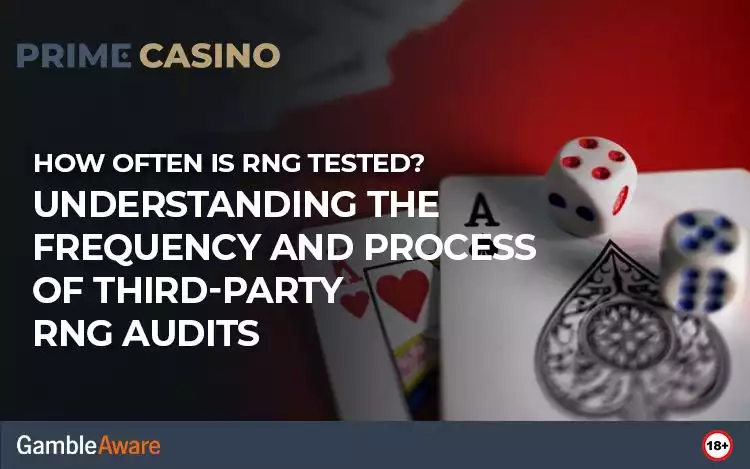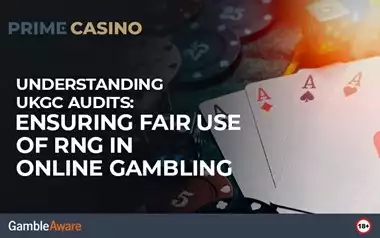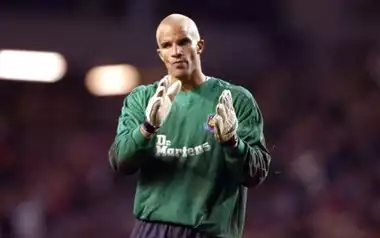Picture this: You’re spinning the reels on your favorite online slot, anticipating the thrill of a big win. But have you ever wondered what ensures that every spin is genuinely random? This is where rigorous third-party RNG audits come into play, giving you confidence that every outcome is fair and truly unpredictable.
This article delves into:
- The role of regulatory bodies – Learn how the UK Gambling Commission (UKGC) and other authorities enforce fair gaming.
- The process of third-party audits – Discover how independent agencies test RNGs to guarantee fairness and integrity.
- How often RNG testing occurs – Understand the frequency of audits and why consistent testing ensures fair play.
- The consequences of failing RNG tests – Explore what happens when a casino's RNG fails compliance checks and how it impacts players.
- Why RNG testing matters for players – See how these rigorous standards enhance trust and transparency in online casinos.
The Role of Regulatory Bodies in RNG Testing
Online casino fairness is upheld by strict regulatory oversight. Bodies like the UK Gambling Commission (UKGC), Malta Gaming Authority (MGA), and independent auditors such as eCOGRA, iTech Labs, and GLI enforce high standards to ensure every game operates fairly.
These regulators require pre-launch RNG certification and ongoing audits to verify that online casino games continue to meet fairness standards. But what does this process entail? Let’s take a closer look at the first step: pre-launch testing.

Initial RNG Certification: Pre-Launch Testing
Before an online casino game goes live, its RNG must pass rigorous third-party testing. This process ensures that every outcome is genuinely random and cannot be manipulated.
Pre-Launch Testing Procedures
Before an online casino game can be offered to players, it must pass a series of rigorous tests by an independent testing agency. These assessments include:
- Algorithm Assessment: Independent test houses scrutinize the RNG’s algorithm to confirm it produces random results without patterns or predictability.
- Statistical Analysis: Extensive simulations are run to compare RNG outputs against expected statistical distributions, identifying any anomalies that could indicate bias.
- Security Evaluation: The RNG’s resilience against tampering and external threats is tested to prevent manipulation from internal or external sources.
- Long-Term Consistency Checks: RNGs must consistently produce fair results over millions of spins or rounds, ensuring randomness is maintained across extensive gameplay.
Regulators such as the UKGC mandate that all RNGs be tested and certified before games are released to players. However, testing doesn't stop there—continuous monitoring is required to maintain integrity in the long run.
Regulatory Requirements
Regulatory bodies, such as the UKGC, mandate that all gaming software, including RNGs, be tested and certified by approved third-party test houses before market release. These agencies, such as eCOGRA, iTech Labs, and GLI, ensure that the RNG meets technical standards and industry best practices for fair play.
Ongoing Testing: How Often RNGs Are Audited
Once an RNG is approved for use, the work isn't over. Regular audits are essential to ensure that fairness is maintained over time. The frequency of these tests varies based on the casino's regulatory jurisdiction, compliance history, and operational changes.
"You can’t manage what you don’t measure." — W. Edwards Deming
This principle holds true for RNG audits, ensuring continuous oversight and fairness in online casino gaming.
Regular Audit Frequencies
The frequency of regular audits can vary, including:
- Monthly Audits: Some jurisdictions require monthly evaluations to promptly detect and address potential issues. This is common in highly regulated markets where player protection is a top priority.
- Quarterly Audits: A common industry standard, quarterly audits involve statistical analyses of game results including UK live dealer games to confirm the RNG maintains random and fair outcomes.
- Annual Audits: Some regulators, such as the Malta Gaming Authority, require yearly certifications, ensuring that a game’s RNG remains compliant.
The frequency of audits depends on the jurisdiction in which the casino operates, the software provider, and previous compliance history. A casino with past RNG issues may be required to undergo more frequent testing than one with a flawless track record.
Factors Influencing Testing Frequency
Several factors influence how often RNGs are tested:
- Regulatory Framework: Different licensing authorities impose varying requirements based on their jurisdictional standards. The UKGC, for example, enforces strict rules on testing intervals and reporting.
- Operational Changes: Any modification to the software, game mechanics, or core RNG algorithms may necessitate immediate re-evaluation by a third-party auditor.
- Historical Performance: Casinos or software providers that have previously failed compliance tests may be required to undergo more frequent audits.
- Jurisdictional Differences: Some jurisdictions require a more stringent testing schedule compared to others, ensuring that casinos meet international fairness standards.
While periodic audits help keep RNGs in check, some operators take an extra step by incorporating real-time monitoring.
Real-Time Monitoring vs. Periodic Testing
Some responsible UK casinos go beyond scheduled audits and implement real-time RNG monitoring to detect anomalies instantly. This proactive approach helps prevent issues before they impact players.
| Feature | Real-Time Monitoring | Periodic Testing |
| Live Data Analysis | Continuous tracking of game results to detect patterns. | Evaluations at set intervals based on regulatory requirements. |
| Automated Alerts | Instant notifications if an RNG behaves unexpectedly. | No immediate alerts; issues detected only during audits. |
| Corrective Actions | Immediate regulator intervention to fix anomalies. | Issues resolved after an audit identifies them. |
| Regulatory Preference | Optional for operators seeking additional security. | Standard requirement for most regulators. |
While real-time monitoring enhances security, most regulators rely on scheduled audits for thorough evaluations of RNG fairness and integrity. But what happens if an RNG test fails?
What Happens If an RNG Fails a Test?
Failing an RNG audit has serious consequences for both casinos and software providers. The repercussions can range from financial penalties to loss of player trust.
Immediate Consequences
- Suspension of Games: Any games running on the failed RNG may be taken offline until the issue is resolved.
- Financial Penalties: Regulatory bodies can impose fines or additional compliance costs for non-compliance.
- Reputational Damage: A failed test can erode player trust, leading to a decline in casino traffic and revenue.
Regulatory Enforcement
Regulators have strict measures in place for handling non-compliance:
- Revoke Licenses: Persistent non-compliance can lead to the suspension or revocation of a casino’s operating license.
- Mandate Remedial Actions: Casinos may be required to implement corrective measures and undergo additional audits before resuming operations.
How Players Can Verify RNG Testing and Fairness
While players may not have direct access to an RNG’s code, there are several ways to confirm that a casino follows fair gaming practices:
- Check for Certification Seals: Reputable casinos display certificates from test houses such as eCOGRA, iTech Labs, or GLI.
- Review Licensing Information: Ensure the casino holds a license from a respected authority like the UKGC or MGA.
- Read Audit Reports: Some casinos publish reports detailing the fairness of their RNGs.
- Consult Player Reviews: Feedback from other players can offer insights into whether a casino upholds fair gaming practices.

Summary
RNG testing is a continuous effort to maintain fairness in online casinos. Before a game goes live, its RNG must pass a rigorous certification process by independent testing labs. However, testing doesn’t stop there. Regulators require periodic assessments, which can occur monthly, quarterly, or annually, depending on jurisdictional rules. Additionally, authorities conduct random spot checks to ensure ongoing compliance, and any software updates trigger a fresh round of testing.
RNG Testing Frequency Table
| Testing Stage | Frequency | Purpose | Authority/Regulator |
| Initial Certification | Before game launch | Ensures the RNG is fair and random | Independent Testing Labs (e.g., eCOGRA, GLI) |
| Periodic Testing | Monthly, Quarterly, or Annually | Verifies ongoing compliance and randomness | UKGC, MGA, and other regulatory bodies |
| Random Spot Checks | Unannounced | Detects irregularities or manipulation | Regulators & Independent Auditors |
| Post-Update Testing | After software updates | Ensures modifications don’t affect fairness | Testing Labs & Regulators |
Conclusion & Key Takeaways
Ensuring the integrity of RNGs is a continuous commitment that reputable online casinos uphold to maintain fair play and player trust. Key takeaways include:
- Continuous Oversight: RNGs undergo initial certification and regular audits to ensure ongoing fairness.
- Regulatory Compliance: Bodies like the UKGC enforce strict testing schedules and standards.
- Player Assurance: Players can verify a casino’s fairness by checking for certifications from approved test houses.
- Testing Frequencies Vary: The frequency of RNG testing depends on regulatory requirements, operational changes, and past compliance history.
- Transparency Matters: Reputable casinos openly share details of their testing procedures to build trust with their players.
By understanding the frequency and process of RNG testing, players can make informed choices and engage in online gaming with confidence.
Experience an online casino that transcends the ordinary. At Prime Casino, we offer an unparalleled selection of over 6,000 games, all rigorously tested for fairness. Join us today and elevate your gaming journey.








